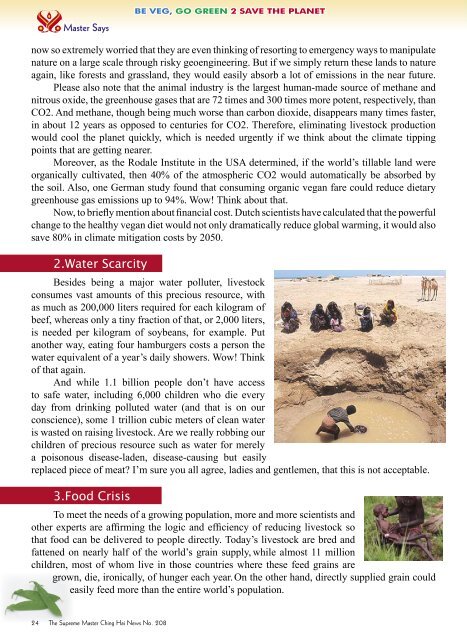Organic Vegan Diet Can Savethe Planet
Organic Vegan Diet Can Savethe Planet
Organic Vegan Diet Can Savethe Planet
Create successful ePaper yourself
Turn your PDF publications into a flip-book with our unique Google optimized e-Paper software.
Master Says<br />
BE VEG, GO GREEN 2 SAVE THE PLANET<br />
now so extremely worried that they are even thinking of resorting to emergency ways to manipulate<br />
nature on a large scale through risky geoengineering. But if we simply return these lands to nature<br />
again, like forests and grassland, they would easily absorb a lot of emissions in the near future.<br />
Please also note that the animal industry is the largest human-made source of methane and<br />
nitrous oxide, the greenhouse gases that are 72 times and 300 times more potent, respectively, than<br />
CO2. And methane, though being much worse than carbon dioxide, disappears many times faster,<br />
in about 12 years as opposed to centuries for CO2. Therefore, eliminating livestock production<br />
would cool the planet quickly, which is needed urgently if we think about the climate tipping<br />
points that are getting nearer.<br />
Moreover, as the Rodale Institute in the USA determined, if the world’s tillable land were<br />
organically cultivated, then 40% of the atmospheric CO2 would automatically be absorbed by<br />
the soil. Also, one German study found that consuming organic vegan fare could reduce dietary<br />
greenhouse gas emissions up to 94%. Wow! Think about that.<br />
Now, to briefly mention about financial cost. Dutch scientists have calculated that the powerful<br />
change to the healthy vegan diet would not only dramatically reduce global warming, it would also<br />
save 80% in climate mitigation costs by 2050.<br />
2.Water Scarcity<br />
Besides being a major water polluter, livestock<br />
consumes vast amounts of this precious resource, with<br />
as much as 200,000 liters required for each kilogram of<br />
beef, whereas only a tiny fraction of that, or 2,000 liters,<br />
is needed per kilogram of soybeans, for example. Put<br />
another way, eating four hamburgers costs a person the<br />
water equivalent of a year’s daily showers. Wow! Think<br />
of that again.<br />
And while 1.1 billion people don’t have access<br />
to safe water, including 6,000 children who die every<br />
day from drinking polluted water (and that is on our<br />
conscience), some 1 trillion cubic meters of clean water<br />
is wasted on raising livestock. Are we really robbing our<br />
children of precious resource such as water for merely<br />
a poisonous disease-laden, disease-causing but easily<br />
replaced piece of meat I’m sure you all agree, ladies and gentlemen, that this is not acceptable.<br />
3.Food Crisis<br />
To meet the needs of a growing population, more and more scientists and<br />
other experts are affirming the logic and efficiency of reducing livestock so<br />
that food can be delivered to people directly. Today’s livestock are bred and<br />
fattened on nearly half of the world’s grain supply, while almost 11 million<br />
children, most of whom live in those countries where these feed grains are<br />
grown, die, ironically, of hunger each year. On the other hand, directly supplied grain could<br />
easily feed more than the entire world’s population.<br />
24 The Supreme Master Ching Hai News No. 208

















